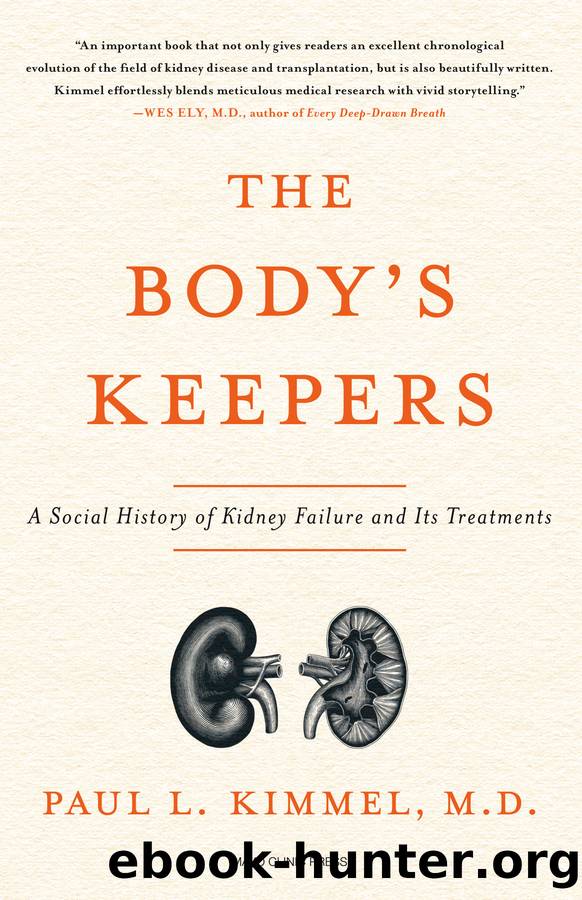The Body's Keepers by Paul L. Kimmel

Author:Paul L. Kimmel [Kimmel, Paul L.]
Language: eng
Format: epub
Publisher: Mayo Clinic Press
Published: 2024-06-15T00:00:00+00:00
Could Higher Doses of EPO Increase Patientsâ Lifespans as Well as Corporate Profits?
No one knew what the optimum goal was for treatment of anemia in patients with kidney disease not needing dialysis. Kidney guideline groups, including those sponsored by the National Kidney Foundation, made suggestions of hemoglobin concentration goals between 11.0 and 12.0 or 13.0 g/dL, but these were not usually based on the hard evidence provided by randomized clinical trials. Hemoglobin concentration is often estimated as one-third of the hematocrit. For instance, a hemoglobin concentration of 13 g/dL roughly corresponds to a hematocrit of about 39%. Guidelines, especially in this field, were based primarily on conjectures regarding quality of life and mostly derived from observational studies rather than the gold standard of randomized controlled clinical trials. The relationships between hemoglobin levels and quality of life assessments were really uncertain because of differences in methods used to assess patientsâ perceptions, different characteristics of the populations studied, and the different scientific study designs used in different research projects. And none of the previous studies could systematically evaluate adverse effects, including importantly, death.
The Correction of Hemoglobin and Outcomes in Renal Insufficiency (CHOIR) study was designed to test the results of treatment of anemia in CKD patients not treated with dialysis with two hemoglobin goals: one close to that of normal people and one closer to the guidelines put forth by various kidney disease advocacy groups. The CHOIR study would assess all pertinent CKD patient outcomes related to the treatment of anemia, including survival. Dr William F. Owen Jr., a young nephrologist at the Brigham and Womenâs Hospital, had participated in key observational research studies while at Harvard. He had published an important paper in the NEJM in 1993, showing survival of dialysis patients was related to their nutritional status as well as the dose of dialysis provided to them.38 Owen contributed to the initial planning and development of a protocol for a study of erythropoietin treatment of anemic CKD patients supported by Ortho Biotech. Dr. Ajay Singh was a nephrologist at the Brigham and Womenâs Hospital in Boston, who took charge of the CHOIR study after Bill Owen left Harvard to assume leadership positions at the University of Medicine and Dentistry of New Jersey. Singh trained in medicine at University College London School of Medicine, and undertook fellowship training in nephrology at the TuftsâNew England Medical Center in 1987, joining the faculty thereafter. In 1998, he joined the faculty of the Brigham and Womenâs Hospital as clinical director of the Renal Division and director of Dialysis Services. He was appointed associate professor of medicine at Harvard Medical School.
The world had changed. Instead of hematocrit, hemoglobin concentration was now the gold standard for the assessment of treatment of anemia trials. The CHOIR study set out to show cardiovascular complications and death rates would be lower in CKD patients treated with recombinant erythropoietin to achieve a hemoglobin level of 13.5 g/dL (corresponding to a hematocrit of about 40.5%) than those treated to a goal hemoglobin concentration of 11.
Download
This site does not store any files on its server. We only index and link to content provided by other sites. Please contact the content providers to delete copyright contents if any and email us, we'll remove relevant links or contents immediately.
Periodization Training for Sports by Tudor Bompa(8271)
Why We Sleep: Unlocking the Power of Sleep and Dreams by Matthew Walker(6722)
Paper Towns by Green John(5189)
The Immortal Life of Henrietta Lacks by Rebecca Skloot(4587)
The Sports Rules Book by Human Kinetics(4385)
Dynamic Alignment Through Imagery by Eric Franklin(4216)
ACSM's Complete Guide to Fitness & Health by ACSM(4060)
Kaplan MCAT Organic Chemistry Review: Created for MCAT 2015 (Kaplan Test Prep) by Kaplan(4012)
Livewired by David Eagleman(3772)
Introduction to Kinesiology by Shirl J. Hoffman(3769)
The Death of the Heart by Elizabeth Bowen(3620)
The River of Consciousness by Oliver Sacks(3603)
Alchemy and Alchemists by C. J. S. Thompson(3520)
Bad Pharma by Ben Goldacre(3427)
Descartes' Error by Antonio Damasio(3277)
The Emperor of All Maladies: A Biography of Cancer by Siddhartha Mukherjee(3162)
The Gene: An Intimate History by Siddhartha Mukherjee(3098)
The Fate of Rome: Climate, Disease, and the End of an Empire (The Princeton History of the Ancient World) by Kyle Harper(3067)
Kaplan MCAT Behavioral Sciences Review: Created for MCAT 2015 (Kaplan Test Prep) by Kaplan(2986)
